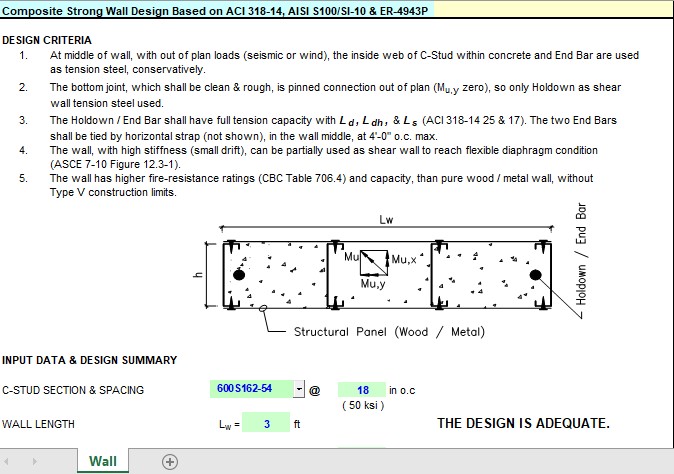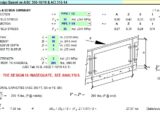
Composite Strong Wall Design and Calculation Spreadsheet
10 December 2022Table of Contents
Composite Strong Wall Design and Calculation Spreadsheet
In the fast-evolving world of construction, composite strong walls are becoming a cornerstone of innovation and efficiency. These advanced wall systems, which combine different materials to achieve superior strength, flexibility, and durability, are redefining how we approach structural integrity and design. In this article, we delve into what composite strong walls are, their benefits, and how they are shaping the future of construction.
What Are Composite Strong Walls?
Composite strong walls are engineered structural elements made from a combination of materials such as steel, concrete, and fiber-reinforced polymers (FRP). By leveraging the unique properties of each material, these walls provide enhanced performance compared to traditional single-material walls.
For example, the steel within a composite wall offers tensile strength, while concrete adds compressive strength and rigidity. FRP can add lightweight durability and resistance to corrosion, making composite strong walls ideal for diverse environments and applications.
Advantages of Composite Strong Walls
- Enhanced Strength and Durability Composite strong walls are designed to withstand extreme loads, including seismic forces, wind pressure, and heavy impact. This makes them an excellent choice for high-risk areas prone to natural disasters.
- Flexibility in Design The adaptability of composite materials allows architects and engineers to create walls that meet specific project requirements, whether it’s for residential, commercial, or industrial purposes.
- Cost Efficiency While the initial investment in composite walls may be higher than traditional options, their longevity and low maintenance costs provide significant savings over time.
- Sustainability Many composite strong walls incorporate recyclable materials, reducing waste and the environmental impact of construction projects. Their long lifespan also means fewer replacements, which contributes to resource conservation.
- Corrosion Resistance Unlike conventional materials that deteriorate over time, composite walls are resistant to corrosion, making them ideal for coastal and industrial applications where exposure to moisture or chemicals is common.
Applications of Composite Strong Walls
Composite strong walls are versatile and can be used in various construction projects:
- High-Rise Buildings: Their ability to handle significant loads makes them a preferred choice for skyscrapers and multistory structures.
- Industrial Facilities: The durability and resistance to harsh conditions make them ideal for factories and warehouses.
- Bridges and Infrastructure: Composite walls are often used in bridges, tunnels, and retaining walls due to their strength and resilience.
- Residential Construction: Modern homes benefit from the aesthetic and functional advantages of composite walls, ensuring safety and design flexibility.
Challenges and Considerations
While composite strong walls offer numerous benefits, there are challenges to consider:
- Higher Initial Costs: The materials and engineering required can be expensive upfront.
- Specialized Installation: Proper installation requires skilled labor and advanced equipment, which can add to the overall cost.
- Material Compatibility: Ensuring the compatibility of the materials used in the composite is crucial for optimal performance.
The Future of Composite Strong Walls
As technology advances, composite strong walls are expected to become even more efficient and accessible. Innovations in material science, such as self-healing polymers and 3D printing, will likely enhance their performance and reduce costs. Additionally, the growing emphasis on sustainable construction will further drive their adoption.
Conclusion
Composite strong walls represent a significant leap forward in construction technology. By combining the best attributes of various materials, they offer unparalleled strength, durability, and versatility. As the construction industry continues to embrace these innovations, composite strong walls are set to play a pivotal role in building safer, more sustainable, and aesthetically pleasing structures.


